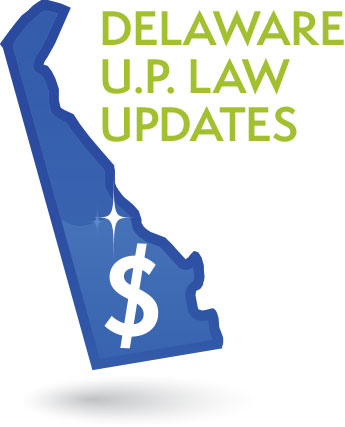Delaware’s Qui Tam Litigation: What it Means for Unclaimed Property Holders
 In the course of a recent qui tam whistleblower lawsuit, the Delaware Superior Court released a preliminary decision related to requests for dismissal by the defendants — 30 retailers and a retail association.
In the course of a recent qui tam whistleblower lawsuit, the Delaware Superior Court released a preliminary decision related to requests for dismissal by the defendants — 30 retailers and a retail association.
Even though the case still has a long way to go before resolution, this early decision and some of the judge’s comments contain clues for holders to help them determine the best way to manage gift-card-related unclaimed property to stay out of court. Because other states sometimes follow Delaware’s lead, this decision could eventually influence unclaimed property law in other states.
Case background: State of Delaware ex rel. French v. Card Compliant LLC, et al.
In May of 2014, a false claims (qui tam) action was brought by the State of Delaware against a third-party gift card issuer/manager, 30 of its retail gift card clients, and the National Retail Federation, which had helped promote the services in question. The action was based on the original filing by a former employee of the third-party issuer, Card Compliant (previously Card Fact, LLC).
The qui tam action alleges that Card Compliant and its retailer clients tried to reclassify certain transferred obligations from escheatable property to non-escheatable, in effect concealing unclaimed property to avoid remitting funds to Delaware.
In the early decision, most motions to dismiss were denied. The judge granted motions to dismiss for three defendants not incorporated in Delaware, confirming the state has no jurisdiction over them. The National Retail Federation’s motion to dismiss was granted because it wasn’t directly involved in issuing any gift cards.
”Qui Tam” LawsuitsDuring the Civil War, suppliers of donkeys, horses, food and other goods were less than honest in their representation of the quality of the supplies. As a result, the False Claims Act (FCA) was enacted to protect the government. The act was nicknamed “qui tam,” which is short for the Latin phrase, “qui tam pro domino rege quam pro se ipso in hac parte sequitur.” It basically means: “He who sues in this matter for the king and for himself.” An FCA lawsuit can be brought by a private person on behalf of the government, in return for receiving as much as 30% of the proceeds of the case. Qui tam lawsuits have only recently been filed for unclaimed-property-related claims. Because of the potential rewards, some believe we may be hearing more of these types of cases in the future. |
In our opinion, December’s court decision contained three main points of interest to holders. Below, we explain those points and the impact they could have on holders.Impact of early decision: Know the holder!
- Transfer of escheatment responsibility — who is the holder? Even though retailers in this case may have believed they contractually transferred unclaimed property liability to Card Fact, the judge appears to believe the retailers retain responsibility for remittance. No matter what the final result of the trial, this early decision indicates unclaimed property holders must make sure transfer agreements with third-party gift card administrators specifically address who is responsible for escheatment. The holder must prove the agreements have economic substance concurrent with the unused card balances. If a third-party administrator accepts contractual responsibility to escheat, the holder still should insist on receiving reports and proofs of delivery to verify property is being escheated correctly.
- State of business formation. When a property owner’s last address is unknown and the holder is not a C Corporation, most states require holders to report to the state of their principal place of business. The judge contradicted this by applying the Second Priority Rule, which says holders should report to the state where their organization was formed. We suggest unincorporated holders seek advice from qualified unclaimed property professionals when questions regarding properties with no last-known address exist to reduce the risk of choosing the wrong state to report to.
- Complexity of gift-card-related unclaimed property. Because this area of unclaimed property law is still evolving, and because rules surrounding third-party administrators tend to be extremely complex, we advise holders with related issues to consult with experienced advocates to make smart decisions both before and after the Delaware case is resolved.
Although this case specifically involves gift card balances, the issues surrounding third-party administrators can be applied to many types of unclaimed property. The case’s outcome potentially could affect the way unclaimed property is managed with third-party administrators across the board. Stay tuned to MarketSphere for more information as this story develops!
If you received a letter or an email, please check out our FAQ section to learn more about next steps.
We offer a customized approach to fit your specific needs.